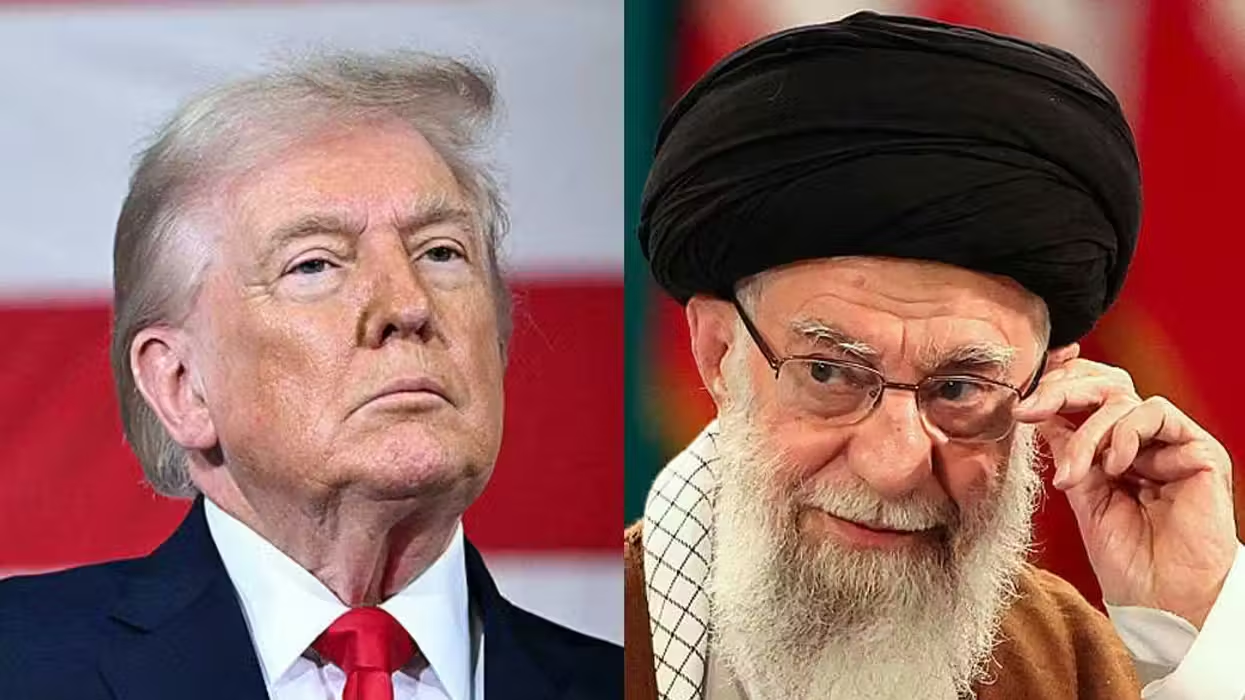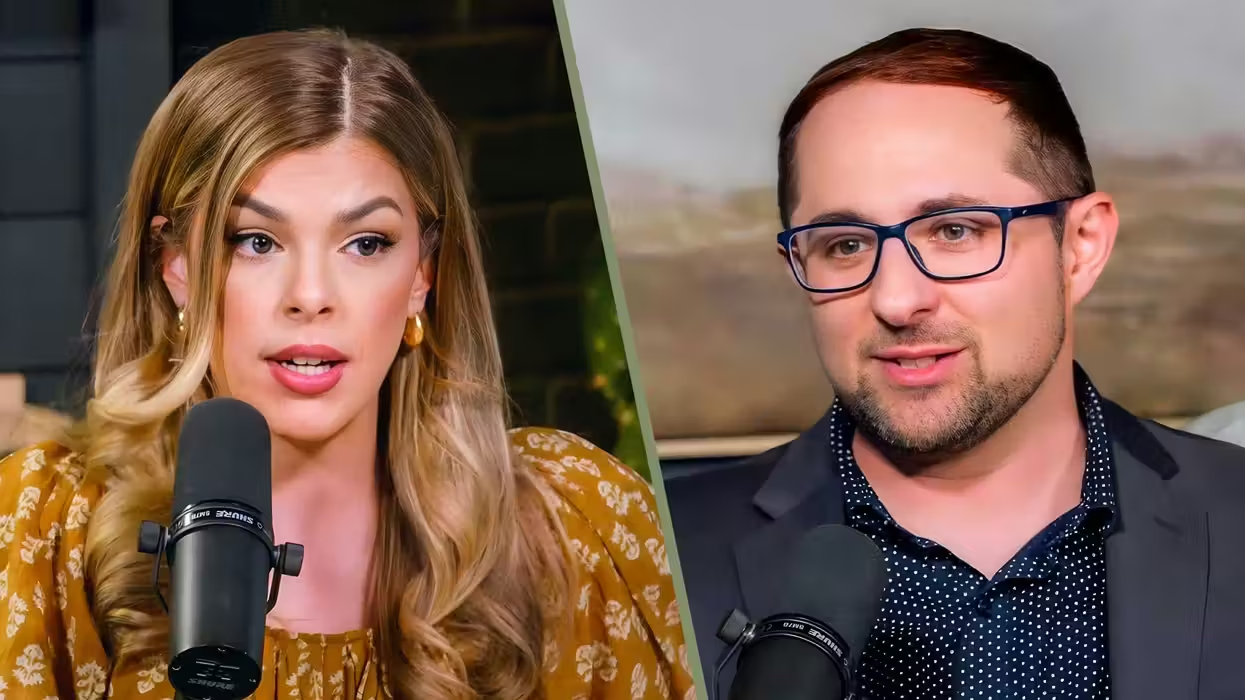
© 2026 Blaze Media LLC. All rights reserved.
An interview with Jim Geraghty on the federal bureaucracy you just can't get rid of, and why Newt Gingrich may throw a rock through his window
June 19, 2014
An interview on Geraghty's new book, "The Weed Agency: A Comic Tale of Federal Bureaucracy Without Limits."
We conducted an interview with National Review's Jim Geraghty in connection with the release his new book, "The Weed Agency: A Comic Tale of Federal Bureaucracy Without Limits," a review of which you can find here.
In the interview, we discussed everything from federal bureaucracies, to government shutdowns, to the "Washington Monument strategy," why Newt Gingrich might throw a rock through Geraghty's window and much more.
The audio of our interview, conducted via phone, as well as a transcript can be found below, with slight edits for clarity and links.
Why should Blaze readers pick up a book about this fictional Agency of Invasive Species?
Geraghty: This is a topic that’s really important. It periodically bubbles up – we have this broad-based frustration with bureaucracy, but not really an understanding of why bureaucracy is so hard to get rid of, and why Washington is so dysfunctional, and why you see screw-ups large and small…sometimes really appalling ones like the VA scandal we’ve seen, but sometimes just sillier ones, like the GSA booking their conferences at these luxury hotels in Las Vegas, and sometimes stuff in between like the Department of Health and Human Services being unable to build a website.
So, I could have a written a very dry textbook, a long, wonky policy piece – but this idea actually came from Dana Perino when she was working at Crown Forum, which is part of Random House, and another editor named Sean Desmond. They had this concept of telling the story of federal bureaucracy in a fictional tale – about people, following people as they work their way through this process. It is based on a federal interagency working group on invasive species. There are a couple of interagency groups, that include 8 or 9 different agencies, including NASA by the way -- apparently they’re concerned about space weeds of some kind. And it seemed like a very good metaphor for the way the federal bureaucracy grows. It starts out very small with a couple pilot programs or initiatives, and before long someone claims that they’re drastically underfunded, and they get a little bit more money. Before long, they are very difficult to uproot, and they spread very quickly.
It just seemed like this very natural metaphor of how government has these kinds of programs that are very hard to get rid of, much to the frustration of lots of people around them. And it is a way of being funny about it. Folks who read me at National Review Online and a couple other places know that I try to be a very jovial guy in my writing because the news isn’t always fun. And yet if you tell people the world got worse today, people stop reading at that point. Even if you have to do this kind of Stephen Colbert–ish sarcasm of "Great news for the Minnesota Health Insurance Exchange – the wait times are down from 90 minutes to 75 minutes, so now you only need an hour and fifteen minutes to get your phone call answered…" If you say it with a smile or joke with some humor, a spoonful of sugar helps the medicine go down. It’s kind of a way getting people to read about something they might not otherwise. There are a lot of people who would never read a book about submarine warfare who read the "The Hunt for Red October." Sometimes a good story can be a way of bringing a topic to people’s eyes that they might not otherwise embrace.
[sharequote align="center"]A good story can be a way of bringing a topic to people’s eyes that they might not otherwise embrace[/sharequote]
Was there one specific news event or personal experience that catalyzed your interest in taking on this project, or was it just the general growth of the bureaucracy over your career watching the metastasizing of the government.
 (Image Source: Getty Images)
(Image Source: Getty Images)
Geraghty: There were two of them. One is something Republicans and conservatives have been talking about for a very long time. I begin the book at the dawn of the Reagan years. In my lifetime, we’ve seen the Reagan Revolution, the Gingrich Revolution, and George W. Bush coming to town – three waves of Republicans, all saying some variation of "We’re gonna reduce the spending of government, we're gonna cut the red tape, we're gonna reduce the bureaucracy." And I think it’s safe to say that none of them have succeeded the way they wanted to.
[instory-book ISBN="9780770436520"]
On the flip side, you also have three Democratic administrations – Carter, Clinton, and Obama – all pledging government was going to do more for people and going to do better for people. It was going to give them free healthcare and all this great other stuff. In those cases, generally, they have not accomplished what they've wanted to. And very often, a slow, unresponsive, very frustrating bureaucracy that is infected with a culture of complacency gums up the works and hinders their – what we think of as crazy utopian kinds of ideas of helping people -- they would dispute that notion. I think they would agree that it is very hard to give people healthcare if the website doesn't work; it's very hard to say we're doing a great job taking care of our veterans if the field offices are sending back false data.
The other aspect I wanted to get into, and you see this in my character of Ava, the young woman who comes to work for the fake, but accurate, Agency of Invasive Species. Washington is a wonderful place in some ways in that a lot of young people come as young adults, either as college students or right after college. And they’re kind of idealistic and they are generally interested in something in the realm of politics – sometimes it's foreign policy, sometimes it's social policy -- abortion, something like that, sometimes it's the environment, economics, or something like that – but they all care about something very deeply. And they’re motivated to try to make the world a better place because of that.
On the one hand, I really admire that. I kind of remember being like that myself; I turn 39 next month, so it’s been a little bit of a while. But it’s one of those things that fuels Washington. On the other hand, most of these people come here, and within a few years they realize that you set out to change the world, and the world changes you. The world doesn’t change so easily. Change comes slowly and frustratingly and with setbacks.
In addition to being about how Washington works, it’s hopefully a very human tale about – what do you do when the original dream of your youth doesn’t quite work out the way you want? How do you adopt to the world not being the way you were taught and the way you expected? And a bit about growing up and finding a way to make a difference in the world when your original plans don't turn out the way you expected.
Conversely, this might have the effect of actually making it attractive to go to Washington in a way that “Wall Street” got people interested in finance - if you think about the two bureaucrats that star in your book, Humphrey and Wilkins and the way they’re able to manipulate and usurp power.
Geraghty: Yeah, it’s interesting. A couple people have asked me about “House of Cards,” and the way Kevin Spacey is this shrewd and utterly ruthless mastermind. My ultimate bureaucrat character, F. Humphrey, is by no means killing people – he’s not quite so nefarious. But he is very often the smartest guy in the room, he very often does figure out some way to manipulate other people into either giving him what he wants or reacting the way he wants, or stymying them when he needs to stymy them.
 Kevin Spacey, left, and Robin Wright arrive at a special screening for season 2 of "House of Cards", on Thursday, Feb. 13, 2014 in Los Angeles. (Image Source: Chris Pizzello/Invision/AP)
Kevin Spacey, left, and Robin Wright arrive at a special screening for season 2 of "House of Cards", on Thursday, Feb. 13, 2014 in Los Angeles. (Image Source: Chris Pizzello/Invision/AP)
I set him up to be an affable villain. Obviously, on the one hand, he is the bureaucracy personified. He is the voice of the status quo, the guy who generally likes things the way they are, and he’s very determined to protect his kingdom within the bureaucracy. But at the same time, he’s kind of likable. He very much enjoys being a mentor to his protégé Wilkins. He tries to protect his people from layoffs during the government shutdown [of 1995-1996]. There’s kind of a key moment in the 9/11 chapter, where, after 9/11, he’s human enough to really want to help the country. He’s just not capable of imagining any way to help the country that doesn’t simultaneously help his own interests. So, to give you an idea of just how twisted he is, his interest and the national interest are completely the same in his mind. There is no split in that Venn diagram there. I’m hoping to make him a character who, even though he’s the bad guy and kind of the problem in the system, you kind of admire how he’s an "escape artist of accountability" -- that he always finds some kind of way to wriggle out from the consequence that looks like it’s bearing down on him.
On the other hand, you have the foil of Nicholas Bader and Caleb Lyons. Talk a little bit about those two characters. In general, were your characters composites? I almost got the sense that Humphrey was a Randian kind of villain from "Atlas Shrugged."

Geraghty: There’s an old British television series, called “Yes, Minister” and then eventually “Yes, Prime Minister”: one of the great comedies in looking at the way government works of all time. They had their character named Humphrey Applebee who was the guy representing the government status quo. So I named my character Adam Humphrey to honor that one. The difference is he’s very much the American and he’s got a bit of an axe to grind against corporations and things like that. In terms of Bader, early on he’s supposed to be this kind of ominous character, so if it sounds like Darth Vader, that’s fine too. But he’s kind of the Pat Toomey, Tom Coburn, Jeff Flake. This is the one guy who’s focused on spending, focused on pork, and fighting the good fight about this stuff.
Now, when I first wrote him, I kind of saw him as my noble hero fighting this stuff, and I wrote him the way I thought a normal person thinks about bureaucracy and government spending and things like that. I showed a draft to some friends of mine who were not as into politics as I am, and they said, “Why is this guy such a nutjob? Why is he so obsessed with this?” -- which was a good indicator to me of how skewed my notion of “normal” is. So as time went by, he was kind of a useful indicator, and then I decided it was more interesting if he was Captain Ahab, and this agency is his White Whale. By golly, of all the waste, of all the stuff in the federal government he thinks is stupid and silly and a waste of money, this agency is gonna be the one he’s gonna get. He focuses in on it, and it kind of turns into this year-by-year, decade-by-decade rivalry between these two men, who are just determined as all hell – one guy determined to preserve his kingdom at all costs, and the other guy determined to get rid of it all costs.
You mentioned Caleb Lyon, and we’ve had all kinds of ideas – Washington doesn’t work the way we wish it did, government doesn’t work the way we wish it did, and in the latter half of the Bush years, kind of starting from the 9/11 Commission, it became this trend of, “Well By golly, we’re gonna have a bipartisan commission.” It kind of turned into a cliché about a politician who can’t come up with any other good ideas always calls for the appointment of a blue ribbon commission to study the problem and come back with solutions. We saw the Iraq study group, we saw the bipartisan commissions on social security, and all kinds of stuff like that.
As you probably gathered from the book, I’m increasingly cynical about this. I think generally they’re kind of used by politicians who either can’t come up with any good ideas by themselves or is afraid to come up with ideas: "I have an entitlement reform idea, but people might not like it, so let me take it to this third-party group and hope that they’ll take the blame for it." And I think there’s a fictional one that comes along in the course of the book, which is an indicator of how usually ineffective those groups are. They issue their reports and studies to great fanfare, but in the end very little changes in a fundamental way. Caleb Lyon, I really enjoyed writing him; he was this naturally heroic figure. We have a few of them left in life – Colin Powell fits as one of them, Norman Schwarzkopf, maybe Robert Gates. They usually come from the defense area, and they are these respected bipartisan figures. The thing is, once you have a respected bipartisan heroic reputation, you’re hesitant to risk it that much. Jumping into something, like who’s to blame for a crisis or something, ruins that. You come down off your pillar, and all of a sudden, you’re in the muck of things. Lyon obviously is very resistant to this at first, but he gets into it, and he generally finds the whole process generally frustrating and annoying. All of his hesitations are beginning to become pretty well-founded.
In the book you do a tremendous job of weaving together real news stories, some semi-fictional news stories, and also pulling in actual historical figures, some of whom are still on the national scene today. There’s a certain "Forrest Gump"–esque feel to that. How difficult was it for you to write in that way, and what led you to write the book in such a way that you could weave everything together.
Geraghty: Well it seemed like a good way of showing why things turned out the way they did. I’m glad you used the "Forrest Gump" analogy. I was reading George Stephanopoulos' autobiography of the Clinton years, and he talked about, during the government shutdown, that they had a meeting with Bob Dole, and Bob Dole during the meeting, let slip that the shutdown was going on, and the blame game was going on, and the question is "Who’s gonna blink?" And Bob Dole says, "Well, one way or another, this has got to get done soon, because I've got to get up to New Hampshire and start campaigning." This is leading into the 1996 presidential campaign. And Stephanopoulos says he nearly spat up the cookie he was chewing because he was just told, "This is when I’m going to concede. I can hold out until this date – it’s around December. I need to get to New Hampshire next month, so basically I’m going to fold in x number of days." He basically is telling the White House, if you hold out until then, I’ll give you what you want. I read this and my jaw dropped. If you ever wonder why Republicans lost the government shutdown fight of late ‘95, early ’96, this is it. Bob Dole needed to run for president.
From that, after the government shutdown, Republicans weren’t too eager to get into a really tough spending fight with the Clinton administration. And so, I have my characters literally hiding behind a curtain overhearing all this. So this is my way of inserting them into the story, but also saying to readers, if you’ve ever wondered why the Gingrich class of '94 lost its steam in terms of trying to cut government spending, this was a big part of it. Little examples like that were kind of fun.
A lot of people so far have reacted to the Al Gore and Newt Gingrich chapters. The Al Gore one – I was talking through the process of writing, and sometimes you sit and you think, and you try to come up with an idea, and you experiment with something and it doesn’t work. The Gore one was one where I just wrote Al Gore – I’ll just say, as a not entirely human creature – and I kind of decided, kind of like "Mad Magazine" or "The Naked Gun," everyone would treat it like it was perfectly normal. No one would say, "Hey, wait a minute, this seems kind of ..." And I just wrote the scene that way, and it just worked tremendously, and it’s hysterically funny. And while on the one hand, we’re talking about why Al Gore’s reinventing government initiative really never did that much of a significant change in the way the government spends its money, in the meantime, we’re kind of laughing because there’s this somewhat science fiction explanation for why Al Gore speaks and behaves the way he does, which just strikes people as something very plausible. And that’s a great revelation of the book basically, right there.
 (Image Source: AP Photo/Cliff Owen)
(Image Source: AP Photo/Cliff Owen)
And the Newt Gingrich one – this is the one where at some point I wonder if Newt and Callista will throw a rock through my window or something like that. Newt has always had two sides to him. On the one hand, this man is a conservative. It’s not like you can say Newt Gingrich is a RINO or something like that. But Newt also has this futurist side of him. He believes in Alvin Toffler, and is fascinated by technology and things like that. So it just seemed natural that when the government agency was on the chopping block and needed to say to Newt Gingrich, "No, we’re worth keeping around," they would sell themselves to this aspect of Newt's personality. And in fact, I loved that chapter because you could see all the little ways that they're trying to flatter Gingrich's ego. And they're desperately trying to find a dinosaur bone to put on a desk because they know he likes dinosaurs, and stuff like that. All of these little things play to his ego and play to him and say, "No no no, we’re just like you. We're exactly the kind of program you would love." Rather than being a negative portrait of Newt Gingrich, he hits it off with my protagonist, Ava, because she too is kind of a “head in the clouds,” dreamer of what technology could do. So it just kind of fits -- the "my liberal government can do wonderful things" character develops a little bit of a crush on Newt Gingrich. All of a sudden, they speak the same language to each other.
The upshot of all this is that this program that Nick Bader and other folks were desperately trying to get rid of – Nick’s not so eager to get rid of – it’s got potential, they have this technological idea that sounds exciting. And it gets spared again to live to fight another day, and lo and behold, once again the weed eliminates getting plucked from the garden.
Now jumping back into the juicier stuff, are there one or two examples of your favorite bureaucratic shenanigans from the book? I know you mentioned the 9/11 episode, which brought to mind LBJ on the airplane flying back after Kennedy was assassinated. Are there any one or two that are your favorites from the book?
 (Image Source: AFP Photo/Karen Bleier/Getty Images)
(Image Source: AFP Photo/Karen Bleier/Getty Images)
Geraghty: There's a reference to something called the "Washington Monument strategy." It basically came back to years and years ago, fighting over I think the Department of Interior budget. Somebody wanted to make a cut to it, and the response from the Department of Interior was if you make that cut, we’re going to have to shutdown the Washington Monument. "No no no, we can’t have that. Oh my goodness," so the cuts gets restored, the funding gets restored. Because the Department of the Interior said that any cut in their budget would mean that they would have to shut down the single most popular thing they do, then the cut gets kiboshed, and they get rid of it. We saw this during the government shutdown of last year.
We see this from the Obama administration all the time – sequestration and stuff like that. If you have to cut anything, your first explanation is to say "Well we have no choice but to cut the single most popular thing we do," in an effort to get the public very upset and writing their Congressmen, “How dare you make these cuts? You’re supposed to cut fat, not bone marrow”. And what it is is obviously these agencies -- let’s emphasize this metaphorically: If someone metaphorically put a gun to their head, they could find 2% of their budgets to cut. In fact, I think you look back, and they concluded from the government shutdown and sequestration, one person lost their job, in some recent study, I think it was the GAO.
What it is, is when you tell a government agency you gotta cut your budget by some small percentage, they’ll move around money so that they don’t have to have layoffs, because naturally, they don’t want people to lose their jobs and that’s a perfectly natural, human instinct of that. So when they really have to, they can find waste to cut out. So the "Washington Monument strategy," when I first started writing this book, was a little bit of a more obscure concept, and I think during the shutdown of last fall, we saw it with the Park Service shutting down the open air World War II museums and things like that. The idea of this theater of showcasing, "Ugh, our budget has gotten so tight. We have no choice but to do these sorts of things," which is obviously very dishonest and is a way of obscuring spending choices instead of trying to spotlight them. And look, we can cut the budget a little bit by getting rid of the stuff we don’t need instead of the stuff we do need, and most people would say monuments and museums and good stuff like that represent good spending.
In the final analysis, what is the moral of this story in your view? And not to give away the ending, but on the one hand there’s sort of a victory but there’s also the bureaucratic status quo that remains. So what’s the moral and then do you see a scenario in which we ever do choose to starve the beast of government?
[sharequote align="center"]There’s a...personal comeuppance or consequence for these characters, but not at the grand...level[/sharequote]
Geraghty: As I was writing this, I had good ideas and I didn’t have a terribly clear ending. I guess you could say I had one ending idea that would work very well if Romney had won, and then the American electorate denied me the ending I was looking for. At one point, my editors were saying, "Could the agency get cut?" I said I’m writing a satire, not a fantasy, not science fiction. The world I'm portraying has to look something like the world…And then magic unicorns come down from the sky," or something. It couldn’t involve that. There’s a little bit more a personal comeuppance or consequence for these characters, but not at the grand, national budgetary level.
I do think that as time goes by, more and more Democrats are starting to recognize that the basic structure of the way the federal workforce operates isn’t serving anybody well, except maybe some of the employees themselves… and even then, I think a lot of federal employees are actually frustrated with this culture of complacency within their offices, particularly the younger ones. Young people go to the government because they want to make a difference. They know the pay isn’t great, although the benefits are good, and I guess the job security is pretty darn good compared to the private sector. But you don’t go to work for most federal agencies because you want to be rich…it’s not Wall Street. So I think you have some allies within the government. I think there are some people who’d like to see the place get a little more efficient, and a little more accountable, and when people screw up, you either get rid of them or demote them or have some sort of more significant consequence there. Because if you look at it, most of the biggest failures of the Obama administration are, in fact, failures of the bureaucracy. They set up recovery.gov and they say every penny we spend is gonna be on there, and then it turns out the site is full of bad data. And healthcare.gov is a spectacular example of it. I mentioned the VA. I don’t think there are that many Democrats who would proudly say that big, fancy conferences at Las Vegas luxury hotels are a good way to spend taxpayer dollars. I think enough of them would say, “No, no, we don’t really need that. That’s not a good way of doing it.” I think there are some reformers in the Democratic Party, and I think the more you see big Democratic ideas crashing on the rocks because the bureaucracy couldn’t move fast enough or wasn’t responsive enough or in some cases, like the VA, was just flat out dishonest -- they will be a little more open to the idea that “Okay, we really kind of have let this culture of complacency…our government institutions just don’t work they way they’re supposed to.” And ultimately, you just gotta change the culture, different leaders, different management, and ultimately probably different hiring and firing rules in the federal government, which will be tough to fight.
And just a last point to note is, the good news is, the bigger and clearer the consequences are, generally the better a government agency performs. The CDC is generally not sloppy about leaving smallpox samples out, so that little kids can grab them and stuff. The military generally sends guys out into the field to fight…the guns work and stuff like that. So if the consequences are life and death, generally people are pretty good at their jobs. That forces diligence and accountability. If the consequences are just, “Ehh, the paperwork moves slower. We don’t respond to that request as quickly as we would ordinarily, then you do have this culture of complacency, where "We’ll get to it eventually," and things like that. So I think that maybe we need some of the Departments…of Commerce, Labor, USDA, and things like that to look at places like the Pentagon and the FBI and the other parts of the government that do work pretty efficiently…and they work a little more efficiently because they have to, because if they don’t, people will die.
Do you have any plans for any further books on inside baseball in Washington? My take from this book is, like you said, you take a concept like the bureaucracy, make it humorous, and put in some human elements to it, you can deal with this topic in a way that’s actually enjoyable and kind of lighthearted. So do you have any plans for any other similar books or even trying to push for this to be a movie?
Geraghty: Obviously, I’d love to see "The Weed Agency" the TV series, or "The Weed Agency" the movie. If you’re interested in the rights, please contact my agent Mel Berger at the William Morris agency. I do think there is potential there. Ideas are percolating. I don't think it would be precisely these characters or this agency or something like that, but I think this format served me well. The feedback has been pretty good so far, and I do kind of like just the concept of looking at big institutions through the eyes of the people who are working in it, sometimes through the eyes of the very bottom level, sometimes the very top, and often times somewhere in the middle -- and looking at it through the human lens, as opposed to the wonky policy lens. This was not very different from writing a campaign spot, and I really enjoyed it. And hopefully we’ll have some more of this in my future.
Want to leave a tip?
We answer to you. Help keep our content free of advertisers and big tech censorship by leaving a tip today.
Want to join the conversation?
Already a subscriber?
Ben Weingarten is a writer, commentator, and editor at large at RealClearInvestigations. He is a senior contributor at the Federalist and writes columns for Newsweek and the Epoch Times.
Ben Weingarten
Ben Weingarten is a writer, commentator, and editor at large at RealClearInvestigations. He is a senior contributor at the Federalist and writes columns for Newsweek and the Epoch Times.
more stories
Sign up for the Blaze newsletter
By signing up, you agree to our Privacy Policy and Terms of Use, and agree to receive content that may sometimes include advertisements. You may opt out at any time.
Related Content
© 2026 Blaze Media LLC. All rights reserved.
Get the stories that matter most delivered directly to your inbox.
By signing up, you agree to our Privacy Policy and Terms of Use, and agree to receive content that may sometimes include advertisements. You may opt out at any time.






